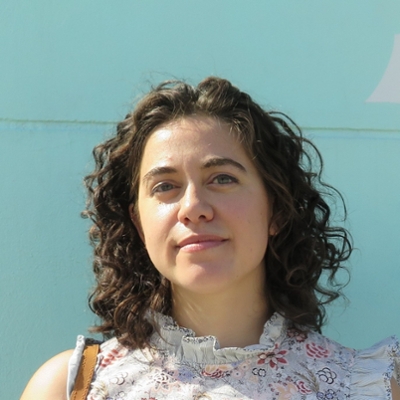
Elspeth Iralu
Assistant Professor
/
Education
- Postdoc, Mellon Fellowship of Scholars in the Humanities, Stanford University
- PhD, American Studies, University of New Mexico
- MPH, Community Health Promotion, University of Minnesota
- MAT, Secondary Teaching, Western New Mexico University
Research
- Indigenous geographies
- Indigenous methodologies
- Critical surveillance studies
- Critical digital geographies
- Counter-mapping
- Visual Culture
Elspeth Iralu (Angami Naga) is an Assistant Professor of Indigenous Planning in the Department of Community & Regional Planning. She is Angami Naga from Khonoma village, Nagaland, and grew up in Gallup, New Mexico. Her research and teaching focus on Indigenous methodologies, Indigenous space, place, and mapping, and violence and visual culture. Iralu holds a Ph.D. in American studies from the University of New Mexico and a MPH from the University of Minnesota. She was a 2022-2023 Postdoctoral Mellon Fellow at the Stanford Humanities Center. Her work has been supported by the Andrew W. Mellon Foundation, the Russell J. and Dorothy S. Bilinski Foundation, and the Naga American Foundation. Iralu’s research in global Indigenous politics and Indigenous geographies examines how everyday militarism, enacted transnationally, shapes global colonial relations. Iralu’s community-based work is primarily located in Northeast India, the U.S. Southwest, and the U.S. Upper Midwest. Her book-in-progress attends to the theories that undergird spatial data collection and Indigenous mapping and considers how these spatial practices support and inhibit Indigenous self-determination, sovereignty, and spatial justice transnationally. Her scholarly writing has appeared in Antipode: A Journal of Radical Geography, Political Geography, ACME: An International Journal for Critical Geographies, The New Americanist, Dialogues in Popular Culture and Pedagogy, Asian Diasporic Visual Culture and the Americas, and American Quarterly. In addition, she serves as an editor as part of the Editorial Collective of the open access journal ACME: An International Journal for Critical Geographies.
CRP 265, Sustainable Community Planning Methods
CRP 470, Artivism: Art+Activism
CRP 470/570 Indigenous Space, Place, and Mapping
CRP 534, Foundations of Indigenous Planning
CRP 538, Community Participatory Methods
CRP 588, Project Development
Peer Reviewed Articles
Iralu, Elspeth, and Dolly Kikon. "Indigenous Pedagogies of Love: Theorizing Nonscalable Worlds."Political Geography 114 (2024).
Iralu, Elspeth. “A Letter for Missing and Disappeared Archives.”ACME: An International Journal for Critical Geographies. 23, no. 1 (2024).
Goffe, Tao Leigh, Shannon Gleeson, Atif Khan, Austin Kocher, Christin Washington, Judith Salcido, Rewa Phansalkar, Ryan Persadie, Anisa Jackson, Elspeth Iralu, Erica Violet Lee, Hashem Abushama, Nisrin Elamin, Randa Tawil, Citlali Sosa-Riddell, Esmeralda Arrizón-Palomera, Kelsey Moore, Lydia Macklin Camel, Mónica Ramírez Bernal, Nancy Morales, Amanda Pinheiro, Ana Ozaki, André Nascimento, Christopher Roberts, Essah Díaz, Reighan Gillam, Juhwan Seo, Priyanka Sen, Andrea Chung, Melanie Puka, Tauren Nelson, and Heidi Amin-Hong. "The World We Became: Map Quest 2350, A Speculative Atlas Beyond Climate Crisis."Asian Diasporic Visual Cultures and the Americas. 7, no. 1-2 (2022): 5-49.
Iralu, Elspeth. “Putting Indian Country on the Map: Indigenous Practices of Spatial Justice.”Antipode: A Journal of Radical Geography. 53, no. 5 (2021): 1485-1502.
Iralu, Elspeth. “On Violence, Seen Remotely.”American Quarterly. 72, no. 4 (2020).
Iralu, Elspeth and Caitlin Grann. “Hell You Talm Bout: Mixtapes as Method for Online Environmental Justice Pedagogy.”Dialogue: The Interdisciplinary Journal of Popular Culture and Pedagogy. 7, no. 2 (2020).
Iralu, Elspeth. “Transnational American Studies as Contrapuntal Methodology.”The New Americanist. 1, no. 1 (2018).
Book Chapters
Iralu, Elspeth and Dolly Kikon. “Colonization Calls My Home a Disturbed Area: A Conversation.” In For Anti-Fascist Futures: Against the Violence of Imperial Crisis, edited by Alyosha Goldstein and Simón Ventura Trujillo. Common Notions Press, 2022: 113-130.
Public Scholarship
Iralu, Elspeth. “What Nagas Eat: Sovereignty and Kinship Under Lockdown.”Species in Peril. Volume 2, Number 1, 2021. Invited to republish by Scroll.in under headline “Why are Indians so preoccupied with what Nagas eat, whether it is dogs, bats, or falcons?” February 22, 2021.
Iralu, Elspeth. “During the Pandemic.”Morung Express. January 4, 2021, republished under the same title in Arunachal Times. January 6, 2021.
Ongoing Projects
NSF EPSCoR, “Enhancing Indigenous Community Resilience to Climate Change Impacts through Partnerships and Co-Development of Adaptation Planning” with Prof. Lani Tsinnajinnie (PI), Prof. Leola Paquin (Co-PI), Prof. Elspeth Iralu (Co-PI), and Prof. Ted Jojola.
Indigenous Atmospheres, with Prof. Jen Rose Smith (University of Washington).
Editorial Work
Editor, Editorial Collective, ACME: An International Journal for Critical Geographies
Contributing Editor, Species in Peril
2024 Women in STEM Award, University of New Mexico
2022-2023 Postdoctoral Mellon Fellow, Mellon Fellowship of Scholars in the Humanities, Stanford Humanities Center, Stanford University
2021-2022 Bilinski Foundation Fellowship, University of New Mexico
2021 Wise-Susman Award, American Studies Association
2018 Dr. Aryo M. Shishak Memorial Graduate Award, Naga American Foundation
OTHER
"Volumetric Sovereignty and Indigenous Visual Culture,” Barry Lawrence Ruderman Conference on Cartography, David Rumsey Map Center, Stanford University
"Global Dialogues: Indigenous Data Sovereignty,” Stanford University Global Studies
"Indigenous Kinship and Multispecies Justice,” UNM Biodiversity Webinar Series
